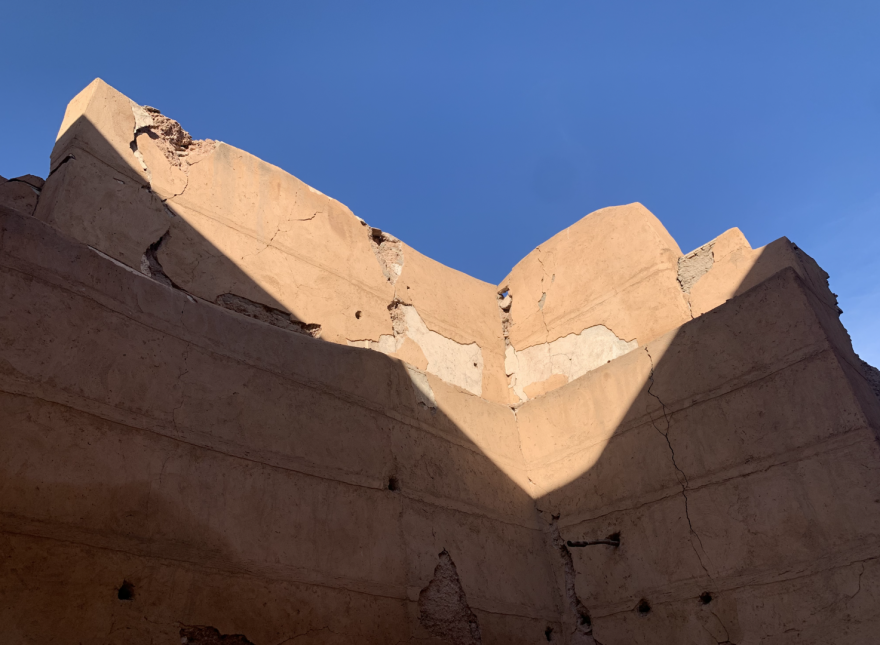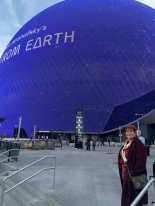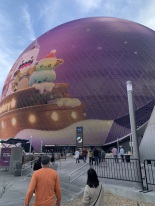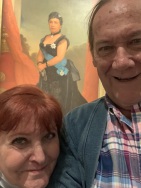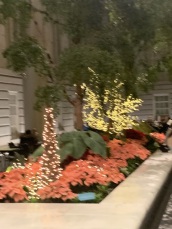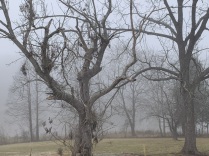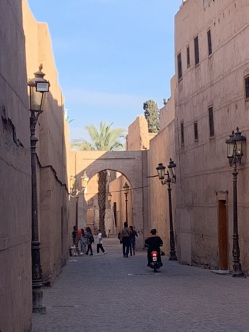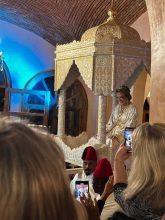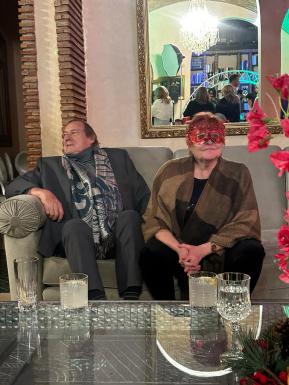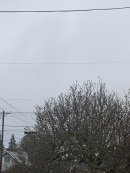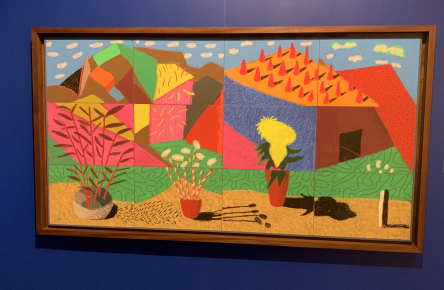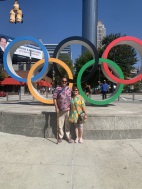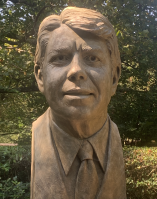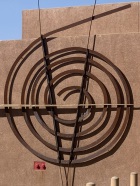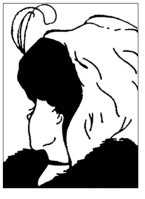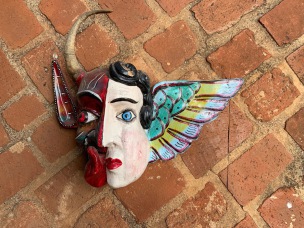the poetics of orthobionomy
a 'book' of beginnings
...and of the possible impossibility of a beginning
(dipping into Life's ongoingness)
What's New is Here and in Process
A Brief Pictorial Review of Where I've Been
(and why I've not been here)
I have neglected this webbiness for several months. After Atlanta much was going on to keep me from it. Most of the distraction was travel. First stop Las Vegas to see The Sphere, the Postcard from Earth show. The Sphere is a paean to Technology. The script for the Aronofsky film must have been produced during the writers' strike: embarrassingly bad. It's all for the spectacle.
Back to VA for a couple days then the final leg of the trip, Tacoma WA to spend Karen's birthday with her old friend. Unfortunately Karen came down with a nasty URI our last day in Morocco. No Hockey games, no going out. We bundled up, watched old movies, played games, sipped whiskey, and talked.
Home now for a few weeks, well recovered, even rejuvenated, and inspired. Inspired in part by a David Hockney exhibit at the Honolulu Museum of Art.
Are we ready for What's Next?
I want to hold small, intimate Residential Experiences in vibrant urban setting. Eight people maximum, including Karen and me. Minimum of 5 days (to count for SOBI as a residential). We want only for our expenses to be covered. Any money beyond our expenses will pass on to SOBI.
If there is a coordinator (and there really shoud be) their expenses and fees need to be included.
Most of the food part will be local restaurants. Whatever lodging is procurred must have a kitchen so eating in will always be an option.
This is inspired by how the Atlanta class turned out, with an Airbnb apartment at Atlantic Station.
Chicago is where we want to go next and we are open to proposals for other places as well. It's hard to say what the cost will be but you can see that with no fee for the Instructor it's probably less than half the cost you'd expect to pay.
We also want to visit the British Isles. This could be great fun in Edinburgh or Belfast. More expense in getting there. Plan your own wander and we all meet up somewhere for 5 days of orthobionomy.
Contact me if you are interested in being a part of a small group Residential.
And Here's a Grander Idea
I want an Anatomy and Physiology grounded on the nature of Life. An A&P of the Body in Relationship, a poetics of A&P. Centered perhaps on the Body Schema, the many ways, and Phases of the Body extending across the globe. How is Care a necessary virtue (and why it gets short shrift in the Virtue lit)?
We will begin with the simplest duality: inside / outside. It becomes clear that Life is the inside of the world and it must have a membrane. So Value is inserted: difference, preferences, selection: all toward the overriding and archaic value: being is better than not being. Becoming is better than unbecoming?
A Five-Day (minimum) Residential (SOBI credit for either Residential or A&P). A follow-on of previous Unphased Wonder Valley Residential.
Aiming for New England territory.
Ideas embodied in orthobionomy practices, praxis.
Three to Four Ortho-Bionomy Advanced Instructors.
Need at least a two-year lead-up; Instructors and coordinators need to be able to commit to regular virtual meetings, and at least one two-day in-person gathering, that is, a class. It could be a hybrid event?
I will set up a separate page to toss in ideas I have for content.
Who would be on your Unphased Dream Team of three or four Instructors?
However, it may show up I will begin a new chapter. For now, I'll call it:
"Anatomy and Physiology of the Body that Isn't"
You can always come up with other ways of looking at things. That's what the Phases gives us, differnt ways to approach the Body, different portals.
Reciprocity as a Law of Life
The Ongoing Action of the Good
“Ortho-Bionomy can’t be taught, it can only be caught.” This was a favorite aphorism of Dr. Pauls. It can be argued that he may have said this merely to defend his own lack of teaching skills. But I can attest to the fact that one of the most important things I learned in the early years of studying under Dr. Pauls was not something that was taught. I had observed that when a person I was working on “let go” of some area of pain or density of tissue (the problem) that letting go in the other was accompanied by some similar letting go in myself. I cannot say who led or who followed but I have learned it does not matter.
I tested this notion out with my very first paid client. A woman I knew casually had been in an automobile incident that left her with a painful whiplash. She had heard I did something that might help and approached me for a ‘session.’ I don’t know what prompted me to approach it as I did except that I did not feel quite up to doing a session as I was experiencing considerable lower back pain. The approach I took was to ready myself to address her neck and then focus on my own back pain, using self-care methods I had been working with (based on Phase Seven).
I did not need to ask her how her neck felt. As soon as we were done she handed me some money, double the amount I had asked for. If this was a tip it was a generous tip; I thought of it rather as her paying for my session as well as her own.
In 1925 a French anthropologist named Marcel Mauss published an important monograph titled “The Gift.”*
Mauss drew attention to the important role of reciprocity in human affairs. This was revolutionary at the time. Since then reciprocity has become a mainstay in the study of ecology. I recently had the opportunity to observe the behaviors of an African Gray parrot kept as a ‘pet’ (put that in scare quotes as one did not dare to actually pet the pesky bird). Mostly I observed how messy and how destructive a creature it was. Most of his food fell to the floor and he kept his mighty beak in shape by shredding all he could of his surrounding: shoes, books, furniture, pretty much anything he was allowed access to. Kept as a pet, the bird was a destructive menace. Respect the beak.
When I imagined the bird in what could have been his natural surround everything he did made perfect ecological sense. I saw that he took no more food than he needed, letting the rest drop to feed others, or to add to the indispensable layer of compost that is most of what jungle soil consists of. He wasn’t wasting the food but sharing it with countless critter-kin of the forest floor. Shredding bits of wood kept his beak in condition and also helped to break down the lignins and cellulose, adding to the compost. And of course, there was his random, constant defecation (pooping on everything). The bird was programmed to practice a necessary reciprocity and his bizarre environment would have none of it. His nature was forced to express itself in a place where nature was exiled.
The word ‘Ortho-Bionomy’ was coined to mean “the correct application of the laws of life.” Pauls never said a word (not in my hearing) about what these laws are that we are to be following and applying. Doing a search of biological literature I soon learned there are no generally agreed-upon laws of life, though there are a number of attempts. Part of the problem here is that Life itself remains free of definition.
In 1943 a famous physicist (those lovers of Laws), Erwin Schrödinger (remember his cat) delivered a lecture series, published later as a book, “What is Life?”* It did little to provide an answer. “...living matter, while not eluding the ‘laws of physics’ as established up to date, is likely to involve ‘other laws of physics’ hitherto unknown, which however, once they have been revealed, will form just as integral a part of science as the former.” Much of the book looks at the seeming paradox of the second law of thermodynamics, explaining why it really is not a paradox, that law of physics remains unbroken (and we need not fear being arrested by the nature police). Despite whatever Schrödinger had to say on the matter there remains no unassailable definition of Life and thus no set of laws of Life.
I can only assume that Pauls’ use of the phrase was intended as poetic. It calls to mind a quote attributed to Werner Erhard, “Ride a horse in the direction it is going.” If I were to try to compile some set of laws of Life I would have to place a Law of Reciprocity near the top. Remove reciprocity and natural (eco)systems degrade, that is to say, there is an increase in disorder. The second law of thermodynamics rules.
I am presently engaged in being trained in a process of lay spiritual care. I was surprised to find the principle of reciprocity embedded in the training. The point of view expressed is that in coming to you seeking help they are offering you a gift. This also returned me to my earlier days in Ortho-Bionomy when I focused on my own ‘problem’ in order to ‘fix’ (forbidden word!) someone else’s. I immediately realized it was a role reversal. The other person, coming to me in need, weak and powerless, is now the healer. It reverberates back and forth, a resonant relationship.
This is the point (I don’t know him to have explained it this way) of the Reflex Pauls named Regret. Touch upon a pain in the Other and while maintaining (soft, soft) contact turn your attention inward to some past regret, feel it, and resolve it. The Other’s pain is likely to vanish with it. Now we know of course that this feeling of regret is a matter of recognizing a shifting pattern of subtle muscular tension throughout the body. By focusing on it we exaggerate it, making it something under our control. Resolving it means letting it go. The Regret Reflex is nothing more than Phase Seven with yourself being the target.
My experience with Ortho-Bionomy is that it is not a zero-sum game—one’s gain is another’s loss. I do not relieve you of your pain by taking it upon myself (play the scapegoat). Rather I offer to find a way in which both can experience a gain. But gain in what? Health, freedom, well-being? Mostly it involves the sense of well-being.
I like to think about the grand migration of the monarch butterfly, that golden beauty with but a fly-speck of a brain (or is it nothing but brain?). It is a journey of thousands of miles, taking multiple generations, a return to the ancestral home: a bit of forest in Mexico. The monarch does not see, smell, or taste its way home. Indeed it ‘knows’ nothing of home. The butterfly simply rides a current of well-being, fully partaking in the essential goodness of life.
Tuning your sense of well-being, while in touch with another’s pain. This is one thing Ortho-Bionomy means to me; this I see as the process of Phase Seven.
*The two books referred to can be found in PDF form:
https://files.libcom.org/files/Mauss%20-%20The%20Gift.pdf
http://strangebeautiful.com/other-texts/schrodinger-what-is-life-mind-matter-auto-sketches.pdf
PROLOGUE
The mistake was to think of myself as singular, integral. I am multiple. And "life is round." Different ways to say the same thing.
A 'session' of Ortho-Bionomy is always only a beginning, in the inchoative.
The correct (ortho) application of life's (bios) laws (nomos): this is given as the intended meaning of the coinage: Ortho-Bionomy.
What is Life? What are its Laws? Ortho-Bionomy 'correctly' applies the laws of life while orthobionomy seeks to discover these unicorns.
This 'book' is messy. People are messy though we like to pretend otherwise.
07 February 2023
It remains a mystery to me, the how and why of it. Reading books is felt as an obligation. Sadly, in my 80th decade, I feel I am only now learning how to read a book. I suppose this means, in one sense, that I am quite young, just learning how to read. Young in other ways as well: as aging systems begin to wobble and weaken I am learning technic of how to move, how to walk. how to be this person I am forever becoming.
Once, to claim (proclaim) I'd read a book all I had to do was look upon each and every word of the book. In that sense, I've read (ticked off) an awful lot of books. I have probably started more books than I've 'finished'. A few books I've reread: five times now for The Great Gatsby, Green Eggs and Ham I cannot count the readings. Some books do not begin until after the first read.
It was Heraclitus, one of the first of the Philosophers, who gets credit for the saying that one can't step twice into the same river; you and the river are different moment to moment. Heraclitus might have said that about reading a book instead of stepping in a river; only difference, the text of a book typically doesn't change as does the flow of a river. Ah, but it does, words are as lively as water. What is freighted along in the fluency of language is as vicissitudinous as a river.
This 'book' (which is to say this so-called book is continuously being subject to change. Commentary can be added to by anyone. It constantly seeks a semblance of organization. Typographic errors remain a while, get seen, get fixed.
I aim for transparency and I will always lovingly defend my opacity. Towards transparency, do I need to declare my neurodivergence? It is here to be seen, upfront, in this 'book' of beginnings . . .
I am waiting here for someone 'important' to tell you (in writing here) why you should spend any more of your precious time (and it truly is precious, my dears) wandering in this inchoative construction I am calling a 'book' (for lack of any better name to call it). Should I ask . . .?
Perhaps you would like to write me a forward.
(AKA Acknowledgments)
I have had to train myself to move gratitude up to the front. Perhaps I will explore in one of my three Introductions why I have struggled with gratitude. For now I will try some simple lists. The start of one list is simple: Karen Valasek, spouse, partner, co-parent, orthobionomer extraordinaire. I would for sure put Lynn Drummer on the list. Probably next after Karen though in Ortho-Bionomy she . . .
PREFACE (1)
Prefaces are usually written last. Look at what you wrote and tell people up front what they are going to read. But that's probably not a rule. This will only be 'completed' when I am no longer able to write at it. Knowing that, I thought it prudent to begin a preface. As the course changes so may the preface.]
Wherein I make up a story of how this 'book' began. But can I pinpoint a beginning? Do beginnings require endings? Why am I doing this and why in such a peculiar way? Maybe I am not doing it but could it be that it is doing me? One thing I can say that is sometimes true is that I do it for my entertainment and amusement. Would this be a good place in the 'book' to introduce myself as neurodivergent? Or does that belong in the Introduction?
Ortho-Bionomy® is a bodywork; a bodywork with a difference. It is a bodywork that has a desire to be something bigger, a desire to transcend itself. That desire to transcend, to evolve, to expand, is what I call orthobionomy. And orthobionomy precedes Ortho-Bionomy ("Life is round") and orthobionomy is a unicorn.
What is 'writing' (and how is writing linked to speaking)? Writing is the art of exclusion. It's what's left over after everything else (that isn't writing, that isn't this writing), has been put aside. My problem in writing (i.e., a problem I confront in writing) is that I can never be sure that something I deem irrelevant to the telling of the tale is not in fact instrumental, hidden predicate. I read reviews of movies. I've yet to read one where the critic includes the meal most proximal to their viewing (or their writing), the state of their own relationships (or lack thereof), a report on the general state of well-being. The critic needs to be seen as having an objective view, telling us what a thing is. It is this thing the Critic says it is, regardless of what medications they are (or should be) taking, how many altered states visited or visited upon. Criticism creates an illusion of objective authority. Exclusion of the personal is a strategy.
[What intrudes on me here is the question: If I later go back and read what I just wrote and find I then (that fictive future me do not believe it true do I erase/replace or leave it as a trace? These sorts of meta intrusions, footnotes, metafluff, process stuff, commentary about the commentary, thoughts about thoughts--in other words visits from Ratatoskr: all that sort of thing I try to remind myself to put in square brackets and italicize. It is the voice of my (fictional) editor. Please also take note that you can click on that foreign name above and it is hyperlinked to where you can learn what I mean if you don't know (no reason you should know) what it means. What is square bracketed and in italics could all be skipped or it can tunnel you into some other world.]
[I want to add that I've tried to keep track of the conventions I deploy by describing them in a Key (Rules of the Game). Notice that this is hyperlinked and green instead of red, which means it carries your eye to another page internal.]
This word "Poetics" will be getting its own chapter but some things need be said early on about what I mean that word to mean. It is not poetry about Ortho-Bionomy (though that is not excluded). It is the creative act of studying something by looking at relationships, looking at the world acting back upon it. Somewhat in opposition to poetics stands reductionism. Only in opposition to the extent that reductionism claims hegemony and insists on a universe. Reductionism defines a thing by taking it apart. Isolates a thing from all other things and breaks it down into ever tinier pieces to figure out how the thing works. Then back-engineering to be its own creator.
I am telling a story about orthobionomy that looks through many different lenses. Phase 4 in Ortho-Bionomy is a crude equivalent to reductionism. I have found it most useful to see the seven Phases of Ortho-Bionomy as a metaphor. The fact of seven Phases is a signal, a pointer. 7 is a semiotic device, not a number; neither ordinal nor cardinal.
This 'book' is being written on multiple fronts. It is a froth. A topic emerges for a bit, a word needs to be traced out, a joke needs to be told, an acknowledgment needs be nodded, proofing and editing, all in a saltatory manner.
INTRODUCTION (1)
I don't know fully what I am introducing. This piling up of words, of fragments and beginnings, keeps becoming something different. Different purposes.
This introduction is associated with deadlines, which I love and hate.
INTRODUCTION (2)
INTRODUCTION (3)
The Phases and the Poetics of Ortho-Bionomy
(Ortho-Bionomy as orthobionomy)
An online Study Group.
[Please note that the word "Poetics" is hyperlinked to its own page where I say what it is I mean the word to mean.]
Theory and practice
Our time together will be brief, we will be apart far longer. We will apportion most of the theory into the apart time. Most of our study group time will be praxis: practice (doing) + reflection, thinking/talking about, making sense, meaning-making. (there is a thing to know about thought: when a thought is only inside it is partial; a thought is complete only in its expression.)
I encourage you to read these notes before we meet up to practice and I know many will not. Some will start and find the writing too something, put off by the 'bad' writing. Many reasons I need not know why you could not do the preparatory reading. I Don't need to know. Yours will be a green experience. We need those in the mix.
There are a lot of words here. That is so that there need be fewer words during the study group time. Chances are good that many reading the notes may feel puzzled, and might find them difficult to grasp.
We will be doing things. If you only do the doings, not read the text, the doings may cause you different meanings. We will want to hear some of one another's experiences of some of the doings. If you read the notes first, which is what I recommend, many things will come into focus.
<< New text box >>
An Introduction to Ortho-Bionomy®
Has moved to its own page
For Montana Chapter of AMTA Annual Conference
19 May 2022
Body Schema
Looking back at my list I wonder where this might go next. We won't know until we are there together doing it. But right now body schema is salient. I direct your here to see what's in the glassary on body schema. I hope to add more to this entry, or direct also to Motor Cognition (see References, Jennerod, Marc) but that's not yet written.
Whatever names we use, whatever words, the curiosity at the core is this: How does a concept, a thought, move matter, achange the world. We want to hang our in that hinge. Playing in the "as-if." We will certainly play the childhood game of Simon Says but will be aiming for a different impact, a different take-away (not "You must pay close attention" as your teacher taught you).
As we play this game we will start to look at movement itself, a phenomenological examination of movement, the experience of movement. Heraclitus wrote that there is nothing but movement. Octavia Butler wrote that God is Movement. We will look at movement apophatically.
News flash! There is no Universe! It's been a multiverse all along.
The Extended Organism
If we were to define the body as the site of physiology then the appearance of the body radically changes. Many necessary physiological functions take place outside of what we normally define as the body. We can begin by looking at the microbiome.
CONTINUING WITH MAGIC*
The natural metabolism of trauma will be a main focus True healing is reciprocal. That is to say, You get the work through giving the workit's not a zero-sum game. We will be playing with the body schema because if there's magic involved . . .
Orthobionomy clarifies the bond between self, other, and world. Care of the Other through Care of the Self
These three classes offer the best methods that Ortho-Bionomy® has to offer to allow the transformation of trauma. Care of another done from a base of care of the self.
More than anything this is time for yourself but it is far from selfish time.
Orthobionomy clarifies the bond between self, other, and world
The Principle of Reciprocity: Care of the Other through Care of the Self
